"Look, the people you are after are the people you depend on.
We cook your meals, we haul your trash, we connect your calls,
we drive your ambulances. We guard you while you sleep.
Do not fuck with us." |
Tyler Durden – Fight Club |
Wow is this late. Mind you, I'm not the only one, given that two of the site's other reviewers promised to deliver their end-of-year reviews earlier this month, yet my inbox has remained host to drifting tumbleweed and the sound of whistling desert wind. Which is a shame given the sheer number of films they collectively saw, which would have doubtless resulted in more interesting and eclectic lists than I was able to produce. You can largely put my own delivery delay down to the process of moving DVD Outsider to Cine Outsider, which effectively swallowed up almost every bit of spare time I had for the last two months of the year. I'm still tweaking the bugs now.
Then again, 2011 was not exactly my favourite year, and a rather a glum one for fairness, decency and humanity in general. From all corners of the world there were stories to sink the heart and confirm both the fragility of life and the unrelenting nature of man's inhumanity to man. It got to the point that when confronted by those end-of-year televisual recounting of key news stories, I simply switched channels. Well I would have done had I been watching TV in the first place. Current British TV depresses me, and my intense dislike of commercials in any shape or form (hence the complete lack of banner or column ads on this site) makes even dedicated movie channels like Film Four an intermittently annoying experience.
In spite of this, one story had me consistently glued to the TV, albeit out of a sense of disbelief and horror, that of the earthquake-triggered tidal wave that devastated whole areas of north eastern Japan. This is a country with which I have a particular affinity, and the images captured of the wave tearing down entire towns and the subsequent interviews with survivors as they revisited what remained of districts in which they once lived was probably the most shocking and heart-rending footage I was confronted with all year. While the western media soon moved on to other things, only popping back occasionally to see how the Fukushima nuclear plant was doing, NHK World continued to run follow-up stories of sometimes miraculous survival and how those who cheated death were adjusting to to the devastation. The stories they told brought home how much of life is governed by chance, and how resilient we humans sometimes have to be.
We can be grateful that our own small island is generally spared the fury of nature, but there was still little for us working stiffs to be cheerful about, as our Coalition overlords continued their campaign to re-establish a system of masters and slaves by punishing the poor for the follies of the super-rich. In November, the Organisation for Economic Co-operation and Development surprised none of us by revealing that the gap between rich and poor is growing faster in the UK than in any other developed country. And at a time when we are supposedly "all in this together," the bottom tenth of earners saw their wages increase by a mere 0.1% over the year (and with food and energy bills soaring and inflation running at 5%, this effectively represents a cut), while a survey by Income Data Services revealed that senior directors at FTSE-100 companies enjoyed a staggering 49% pay rise over the same period, putting them on an average of £2.7 million a year. In my own area this imbalance is particularly keenly felt, with a report from campaign group End Child Poverty identifying that the child poverty rate in one local ward now stands at a startling 45%. And if you fall in that bracket and are the victim of injustice then it will soon be tough luck, as the proposed cuts to legal aid will ensure that fair treatment will be available only to those with the money to buy it.
To throw petrol on the fire during a grim November, a no-talent celebrity who got rich on the back of publicly funded television suggested that undervalued and less generously paid public employees like nurses, teachers, support workers, bin men and the like should be murdered in front of their children for legally protesting against changes to a pension scheme they have been paying into for years, and will be doubtless be reliant when they reach pension age, should they actually live that long (two of my closest relatives did not). To paraphrase and old adage, it's better to remain silent and let everyone think you're a useless tosser than to open your mouth and remove all doubt.
When it came to film, or at least the sort of films that this site and cineastes around the world celebrate and enjoy, there was equally bad news from the top of the idiot tree. In the latest in a whole series of do-me-a-favour statements, the lizard Cameron ended the year – or rather started this one – by demonstrating his pig-ignorance on how the film industry works with the suggestion that British cinema, like just about everything else in the Coalition candy-shop, should not be about art, education or even spiritual fulfilment, but making big wads of cash. His assertion that British filmmakers should focus on mainstream films completely ignores how dependent these films are on the low-budget independent sector for their ideas, their technique, their new directors and technicians, and even their future stars. And before he starts throwing public money at a whole slew of mainstream projects in the deluded belief that the results will automatically do Harry Potter business, I have two words of caution: Heaven's Gate. If you're not old enough to recall what Michael Cimino's artistically fascinating box office catastrophe did for the Hollywood studio system, and United Artists in particular, then do an on-line search. It's a fact of cine-economics that most mainstream Hollywood films actually don't do big business. Despite their reliance on previously successful formulae, every one of these films is a calculated gamble, and the studios that bang them out are still reliant on the few that do really catch box-office fire to provide the funding for those that stumble and fall. I forget who it was, when talking about film industry power play, who noted that if a Hollywood studio took its annual budget and stuck the money in a high interest bank account instead of spending it on films, they'd actually make more money. As screenwriter William Goldman once wryly observed about the process of making a successful movie: "Nobody knows anything."
On a more upbeat note, 2011 also saw the resurgence of mass protest on a truly global scale, with morally motivated citizens coming together in a range of common causes for everything from highlighting the evils of corporate capitalism to bringing down tyrannical governments. Particularly dear to my heart is the Occupy movement, who along with the more high-tech Anonymous group, have become symbolic of modern-day active protest at a time when I was starting to believe that lethargy and glum acceptance had consigned such spirited action to history.
What is a little surprising, and more than a little sad, is the absence of a worthy cinematic response to this increasing level of social injustice. For too long it's been left to the likes of Ken Loach and John Pilger to be the high profile film voices of British social protest (and come on, our Ken is 76 this year), and take a quick look through the key British drama and documentary works of 2011 and there are precious few that deal with localised social and political issues. Instead we have the abomination that is the Thatcher movie (no-one I know appears willing to call it by its chosen title), a sanitised portrait of a ruthless politician who brought misery to millions and created a society in which people were encouraged to think only of themselves and their immediate families, to chase after money and consumer goods and damn those who get caught in the flotsam. It's an attitude that appears to have come back into vogue, yet when angry and disenfranchised kids took to the streets and put this disregard for others and the acquisition of material goods into anarchic practice, the policy's biggest supporters were screaming from the rooftops.
OK, rant over, for now at least. So what about the films? I'll freely admit that I've seen less than my usual this year, thanks largely to the time-swallowing work required to set up the new site, move the content over, strip out the rogue CSS code I managed to accidentally create and reformat the resulting screw-ups on a page-by-page basis. Oh the joys of amateur web design. This also meant that a good many reviews that should have been posted are either sitting half-complete or have not even attempted, including a small number of excellent Eureka and Masters of Cinema releases and a slew of Artificial Eye titles. This really burns me, as these are exactly the sort of distributors we set up the site to support. And what a great year Masters of Cinema in particular have had, their top-notch releases of cult classics like Silent Running and Touch of Evil providing an exciting signpost of things to come (their Blu-ray of Repo Man is already on next year's list). Second Run have continued to produce excellent DVDs of great but too-little-seen examples of East European cinema, Arrow have expanded into new areas with their Arrow Academy and Arrowdrome labels, Peccadillo continue to showcase the best in international LGBT film, and the BFI just keep on producing top quality releases of everything from short film collections from years past to acknowledged classics. The only reason there aren't any BFI discs on the list below is that we have to specifically request review discs from them, and I simply haven't had the time to take any on – those we have covered have been handled by other reviewers, sometimes at epic length.
Unlike a couple of my more metropolitan based colleagues, I live in an area where the cinemas offer a choice between bad mainstream films, bad mainstream remakes, and odd tolerable work that you'll still only go and see if there's nothing better on disc at home, and there generally is. As usual I've been reliant on the film society I co-run for most of the worthwhile cinema visits, and as ever we've had to wait until the films we want to show have completed their week-long runs elsewhere before they're farmed out to us. This means that some of the films that I enjoyed most this year were on other people's best of 2010 lists, and why I'm only now catching films like Melancholia, The Guard, We Need to Talk About Kevin, Take Shelter, Tyrannosaur, Kill List and Miss Bala, to name but a few.
A couple of films I did catch at the cinema and high expectations for I was unexpectedly disappointed by. The key candidate here was The Social Network, a widely praised film that I just couldn't connect with, despite some smart dialogue and direction (though Zodiac it ain't) and a central performance that, though enjoyable in itself, struck me as a little one-note, an archetypal computer nerd who bares little resemblance to the cheery and upbeat Mark Zuckerberg of any number of video interviews. Of course much may be down to my antipathy towards Facebook and its trivia-dominated ilk, whose invention given the sort of cinematic status here as the discovery of Penicillin. I was thus a little amused to read in a Guardian interview that on first seeing a 45-minute rough cut, score composer Trent Reznor described it as "just fairly unlikable guys bitching about stuff in rooms."
So what did I like? Well rather than split my list up as I usually do, I've decided to just pick twenty titles, a combination of films, DVDs, Blu-rays and TV. Had I had more free time to play them, I may even have added a couple of games. It's not an adventurous list, and I'm not even going to claim that some of these represent film at its 2011 finest – they are just twenty personal favourites that, for a short while at least, made the world seem a nicer and more interesting place.
There are plenty of other titles, of course, that should have been on the list but which aren't, victims of whatever mood I found myself in when I drew up and revised it. Films I caught for the first time in 2011 that fall into this category include Alejandro González Iñárritu's sobering and impressive performed Biutiful, Shion Sono's punishing but oddly mesmerising Cold Fish, Ferzan Ozpetek's lovely Loose Cannons, Gareth Edwards' low-budget gem Monsters, Xavier Beauvois' intelligent and emotional Of Gods and Men, Michelangelo Frammartino's quietly hypnotic Le quattro volte, Sebastian Junger and the late Tim Hetherington's war documentary Restrepo, Asghar Farhadi's gripping A Separation, Juan José Campanella's immaculately handled The Secret in Their Eyes, André Øvredal's joyously inventive and witty TrollHunter, and Apichatpong Weerasethakul's ethereal Uncle Boonmee Who Can Recall His Past Lives.
Discs I'd heartily recommend that aren't on the list (and by rights should be) include Optimum/Studiocanal's Blu-rays of Oshima's Ai no korîda, Kim Jee-woon's I Saw the Devil, Nic Roeg's Don't Look Now and Michael Mann's Manhunter; Second Run's typically fine DVD releases of Maria Saakyan's The Lighthouse, Jiří Menzel's Larks on a String, Miloš Forman's A Blonde in Love, and the must-have The Miklós Janscó Collection; Odeon's Blu-ray of Michael Reeves' Witchfinder General; and Masters of Cinema's dual format and/or DVD releases of Antonioni's Le Amiche, Pedro Costa's Colossal Youth, Doug Trumbull's Silent Running, Imamura's The Ballad of Narayama, Fritz Lang's The Indian Epic, and John Ford's The Iron Horse. My access to region 1 discs was cut off midway through the year when I donated by multi-region player to a worthy cause, hence the absence of any Criterion discs on the list this year. A multi-region Blu-ray player remains a key object of desire. And so to...
Attack the Block (Optimum)
An inventive and street-smart low-budget gem of a debut feature from Joe Cornish, one that managed to be exciting, funny and just a little socially conscious. It took me a while to catch up with this one for some reason, so I was in danger of having my hopes set too high (something that no doubt contributed to my lack of engagement with previous Brit horror-comedy Shaun of the Dead), but Attack really delivered. It also scored points for not translating or softening the kids' street patois, which you pick up as you go along, much as you would if you were hanging out with these guys. On the basis of this, I'm prepared to forgive Cornish for his contribution to the script for that horrid Spielberg Tin Tin movie.
The Arbor (Verve Pictures)
A late viewing due to our delayed cinema screening, but as unique and extraordinary a biographical documentary as I have watched in years. Clio Barnard paints an almost cubist portrait of playwright Andrea Dunbar through the words of her immediate family, blending strangely hypnotic re-enactments with archive material and a bold and brilliant performance of the play of the title on a green at the housing estate on which Andrea lived.
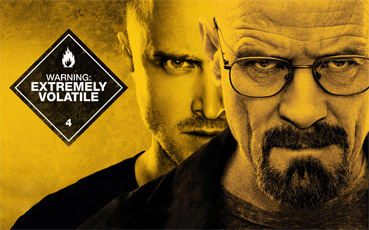
Breaking Bad (AMC TV)
What does it say about the condition of current home-grown TV drama that I just can't imagine a British version of a show like Breaking Bad? This is the sort of series that American cable channels like AMC excel at, chance-taking drama that's prepared to push the moral envelope and is driven by attention to story and character, exactly the sort of thing that American mainstream cinema seems to have long since given up on. If you don't know the series then the setup alone should give you an idea what I mean. A meek but talented chemistry teacher is diagnosed with terminal cancer, and rather than tell his family, he secretly teams up with a drug-dealing ex-student to create the best crystal meth on the planet, the aim being to sell it and make enough money to ensure his family's financial security after he dies. Things, unsurprisingly, do not quite go to plan. In the first series alone the show went to some dark moral places, but as it moved into a second, third and fourth seasons, it's shown no sign at all of loosening its grip or mellowing out in the slightest. This is superb, morally dangerous television that provides a showcase (and Emmy Award winning) central role for Malcolm in the Middle's Bryan Cranston.
Death Notice: Ikigami (MVM DVD)
Probably the least widely seen of the films on my list, yet it remains one of the smartest, most surprising and emotionally affecting films released on DVD in the UK in 2011. An impeccably handled fable on the preciousness of life, the film is set in a near-future Japan in which one in every thousand have a capsule in their body that will kill them between the age of 18 and 24, a government policy designed to instil a respect for life in its increasingly disorderly youth. Working simultaneously on a number of dramatic and metaphoric levels, its focus on how the victims cope with their last twenty-four hours on earth (they're given advance warning of their death to get their affairs in order) is heart-rending stuff and twice reduced me to tears. What a softy.
Faccia a Faccia (Eureka DVD)
A superb but little seen and in some ways atypical spaghetti western, one that charts the transformation of one Brad Fletcher (played by blue-eyed Gian Maria Volonté from For a Few Dollars More) from mild-manner tubercular schoolteacher to ruthless bandit leader, upturning a number of genre traditions on the way while simultaneously delivering on the promise of others. One of a number of boffo rediscoveries by Eureka this year, it was originally slated for a Blu-ray release, but downgraded to DVD when, we can presume, the transfer didn't quite come up to the MoC HD standard.
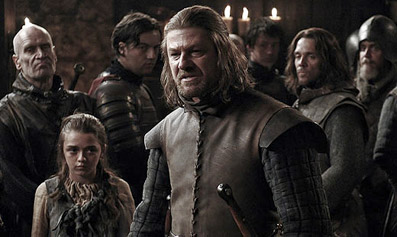
Game of Thrones (HBO TV)
I don't watch a lot of TV, and little of what I do see is home grown these days, with American cable channels like HBO having long since inherited the BBC's mantle for producing innovative and top quality television drama. One of the best last year was this hauntingly atmospheric and dramatically riveting adaptation of George R. R. Martin's A Song of Ice and Fire, whose first-rate international cast includes what could be a career-best performance from Sean Bean, a wonderful turn by dwarf actor Peter Dinklage as the cheerfully hard-drinking womaniser Tyrion Lannister, and a terrifying performance by Jack Gleeson as the evil child Prince Joffrey Baratheon. It's a testament to the series' strength as drama that despite the broodingly downbeat atmosphere, the unhurried pace, and almost complete lack of action in the first few episodes, it's never less than compelling.
Harakiri (Masters of Cinema Blu-ray/DVD)
Kobayashi Masaki's extraordinary, slow-burn anti-samurai movie was given exemplary treatment as part of Eureka's Masters of Cinema series. A film that sucks you in through a process of gentle intrigue, it then grinds you into the ground with what must rank as one of the most punishing sequences ever committed to film, in which an poverty-stricken young samurai is honour-pressed into committing seppuku with a blunt bamboo sword. A delicious high-def transfer gives the Blu-ray a serious edge over the DVD, but they're both in the same box so you can take your pick.
Heartbeats (Indie Network Releasing)
I actually caught Xavier Dolan's enthralling second film first on TV after missing the chance to catch it in London (and given that I was behind the camera on our interview with lead actress Monia Chokri, I have no real excuse), and was bewitched by its style and its cornucopia of influences in a way that I had convinced myself in advance that I probably wouldn't be. Things that shouldn't have worked proved strangely hypnotic – an ultra-slow-motion follow-shot of the three leads walking into a party to the aural liveliness of House of Pain's Jump Around is fine example – and the film's structural style and engaging trio of leads (which include director Dolan, who's still only 23) stop even introspective discussions from playing like cinematic navel gazing.
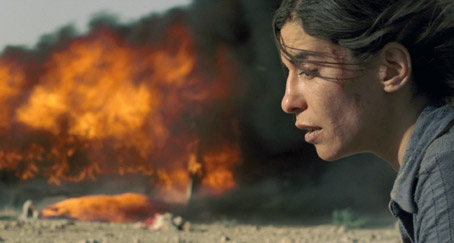
Incendies (Trinity Film)
If I had to choose one film as my overall favourite of the year – and I really don't like doing that – then there's a damned good chance that Canadian director Denis Villeneuve's utterly rivetting drama would take the prize. A fascinating setup has a brother and sister attend the will-reading of their recently deceased mother, where they are charged with tracking down and delivering letters to a father they thought was dead and a brother they never knew they had. A compelling journey of discovery unfolds in which secrets of the past are gradually unlocked, a process that delivers some genuine shocks and at least one scene of almost unbearable tension. So wrapped up in it was I that it took fellow reviewer Camus to point out that the key supporting role in this sequence was played by Jackie Sawiris, a very fine actress with whom we both worked not so long ago.
Inside Job (Sony Pictures)
It seems only appropriate that a film exploring the causes of the 2008 global meltdown, one that we are now still living with the consequences of, should be made in the very country in which those events occurred. But who could have expected a film that so clearly and level-headedly explains the details of how the American economy was sent into nose-dive by the self-serving actions of obscenely greedy and unprincipled men? Particularly satisfying is director Charles Ferguson's calmly effective grilling of those who have continued to profit from the recession they were responsible for triggering. One of a number of persuasive and well-handled American political documentaries released last year, but for clarity, even-handedness and its final call to arms, Inside Job is one of the best.
Neds (Entertainment One)
Peter Mullan's third film as director is his best to date, a searing and intelligent portrayal of how just about anyone can be negatively shaped by their environment and peers. There are some superb performances here, particularly young Conor McCarron as transformed teenager John McGill, and the sequence where he binds blades to his hands and goes out looking for almost suicidal trouble had me ground into my seat with fear at what was to follow.
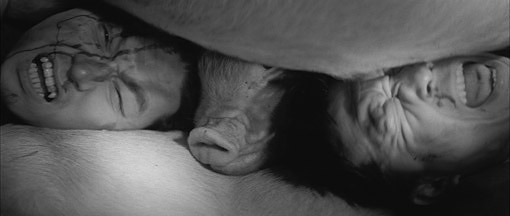
Pigs and Battleships (Masters of Cinema Blu-ray)
One of a number of Imamura Shohei films released on dual format by Masters of Cinema this year as part of a still on-going project to release the main body of this crucial Japanese director's work – whose body of work I once complained at the lack of availability of in the UK – on DVD and Blu-ray. In an effort to avoid filling the list with MoC releases (I could have, you know), I'm choosing this over the equally impressive The Ballad of Narayama because of how warmly I responded to this film's playful energy, bold technique and inventive use of social metaphor. A crucial film of both the Japanese New Wave and Imamura's development as a filmmaker, it's one of my most re-watched discs of 2011, and arrives coupled with Imamura's hugely enjoyable Stolen Desire.
Quatermass and the Pit (Studiocanal Blu-ray/DVD)
The best of Nigel Kneale's Quatermass stories became one of Hammer's finest films, and remains one of the smartest and scariest science fiction movie ever made. The HD transfer on Studiocanal's Blu-ray is lovely, particularly for a film of this vintage and budget, and the disc also boasts a solid collection of extra features, the only blip being the sound mix on the included World of Hammer episode. Otherwise, a joy.
Sawako Decides (Third Window Films)
A bit of a left-field choice this, a film that has attracted some middling and even negative reviews, though part of this appears to stem from its celebration of unremarkable lives. A lot of people, it seems, still like their lead characters to be winners rather than people like us. The Sawako of the title is a directionless young borderline alcoholic who reluctantly returns to her home town when her father is taken ill and hesitantly takes over the running of his freshwater clam business. It's a film that ambles rather than strides, and just occasionally it lets conversations run on for what feels like too long, only to then snap them to a close in unexpectedly witty fashion. There is some lovely character stuff here, and the lyrics of Sawako's rewritten work song gave me the biggest laugh I had in a cinema all year.
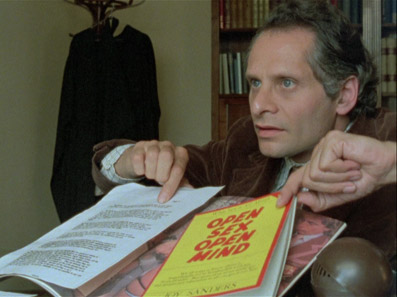
Tales out of School (Network Blu-ray)
Now this is why we are so supportive of independent UK distributors. With this excellent release, Network not only made available four of the finest TV plays of the last forty years, they did so on high definition from carefully restored masters, and included two excellent and substantial on-disc extras. Written by David Leland and exploring different aspects of the then current British education system, all four plays make for intelligent and riveting drama, and include the now famous career-launcher for Tim Roth, Made in Britain, which looks better here than it ever has.
Taxi Zum Klo (Peccadillo DVD)
My technical duties have really impacted on our coverage of releases from some of our favourite distributors, particularly the excellent Peccadillo Pictures, whose LGBT specialism often sees their output unfairly pigeonholed, but which frequently highlights fine films that would otherwise go unseen in the UK (the very recent Life, Above All is an good example, and one I am in the process of reviewing at the moment). Taxi Zum Klo was a special edition revival of a ground-breaking queer cinema classic, one whose upbeat tone and energy presents a a frank and pleasingly upbeat view of pre-AIDS era gay relationships. Some fine extras too, making this worthy of that Special Edition label.
Touch of Evil (Masters of Cinema Blu-ray)
It was about this point in the year that I realised my lack of a multi-region blu-ray player wasn't such a problem after all, at least not while Masters of Cinema are putting out releases of this quality. Consider this Blu-ray of one of the most well-loved cult movies in cinema history – three cuts of the film, two of them in different aspect ratios, all of them meticulously restored, four commentary tracks, a 56-page booklet and a spattering of other very worthwhile extra features. How could you not love this?
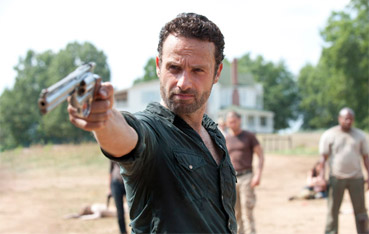
The Walking Dead (AMC TV)
The first six-episode series of Frank Darrabont's The Walking Dead was an absolute revelation to me. I had, I'll admit, become utterly fed up with the whole zombie sub-genre, which almost always plays to a rigid formula and has become overrun with American college student fan-boy low-budgeters in which the filmmakers and their mates dress up as post-Romero zombies and run-around biting and shooting each other, with no thought to plot, subject or genre development. Then The Walking Dead came along and changed everything. As an American cable series with a decent budget, it had the running time, writers, filmmakers and actors to focus almost heavily on character and the experience and emotional turmoil of surviving in a post-apocalyptic world. And, by thunder, it was scary, gripping me in a way that had me itching madly to get my hands on each new episode. The second series has started well, but with more episodes to play with the makers have rooted the characters to a single location and seem to be addressing a smaller range of issues than they did in series 1. But all that changed when it broke up for the holidays on an absolute mother of an episode finale that has made the wait for episode 8 – tantalisingly titled Nebraska – almost unbearable for series fans.
Who Can Kill a Child? (Eureka DVD)
Film rediscovery of the year and then some, this extraordinary but criminally uncelebrated 1976 Spanish horror film is the smartest, boldest, and scariest genre film I saw all year. It broke with a number of genre traditions, dragging horror out of the darkness and into the deceivingly paradisiacal glare of the Mediterranean sun, and featured the most frightening children this side of Midwich, not through some paranormal evil but by playing on their innocence and suggesting their actions were somehow a response to centuries of child cruelty. By the end of the film an isolated horror has developed into something altogether more apocalyptic. Superb.
Winter's Bone
One more I caught later than everyone else because I wanted to see it in the cinema first, but boy was this worth the wait. A richly atmospheric and deceptively low-key drama from director and co-writer Debra Granik, in which secrecy and the bonds of family create an aura of potentially lethal menace that oozes from every corner of the evocative Ozark mountain village landscape – there were moments here when I feared for the safety of the strong-willed young female lead more than I have for any horror movie character in years (remember, Who Can Kill A Child? was made in 1976). A superb central performance from Jennifer Lawrence is given a run for its money by a quietly terrifying one from John Hawkes as Uncle Teardrop, an actor we got to briefly meet and talk to during our London Film Festival coverage.
Well, that's it for another year. With the site shift now complete, I can get back to focussing on films rather than code and graphics, and start saving for that multi-region Blu-ray player I've been promising myself for over a year now. Here's to another year of smart, entertaining, thought-provoking and challenging non-mainstream films.
|